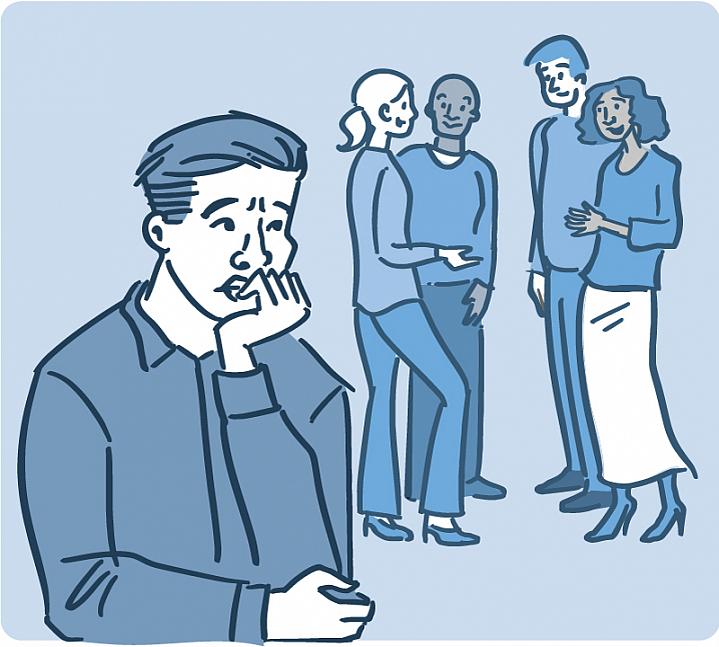TW: MENTION OF SUICIDE

What is the relationship between social anxiety and suicde?
As mentioned in the previous post, I will be discussing suicidal ideation and its effect on teens.
Suicidal ideation includes suicidal thoughts or ideas, describing a range of thoughts and wishes related to suicide and death. It can be controlled by an individual, therefore attempts will not be made even while reporting their ideations. (Duong, Harmer, Lee, Saadabadi, 2021) Warning signs of suicidal ideations often differ in adults, though it is commonly presumed that it is only found in adults with severe trauma. Ideations in teens are commonly caused by untreated depression, trauma, drugs, social difficulties, stress, abuse etc. there is no definite cause Rudlin, 2020). The uncertainty of the future and internalizing problems is significantly associated with suicidal ideation. Professional interventions for adolescence experiencing suicidal ideation could alleviate stress and pessimism about the future, and lessen the anxiety of socializing and being in public.(Dubowitz et. al, 2013)
Suicidal exposure does not lead to increased suicidal behaviour amongst the peers of the deceased, but it does have a long-term effect on depression, suicidal ideations, anxiety and PTSD. Youths who knew about the plans of the suicide of the victim were at greater risk of depression and PTSD. (Brent, Mortiz, Bridge, Perper, Canobbio, 1996) More than 70% of people globally receive no treatment for their mental health because of the social stigma related to mental health issues. They’re afraid of the social rejection due to their illness, therefore leading to more serious problems like SI. (Henderson, Evan-Lacko, Thornicroft, 2013) The barrier that the supposed social stigma provided for people with mental illness increased the chance of mental health worsening, leading up to suicide ideations. (Henderson et. al, 2013)
Loneliness is the key to tying social anxiety to suicidal ideations in teens. Loneliness should be heavily addressed while treating teens who are socially anxious adolescents. (Gallagher, Prinstein, Simon, Spirito, 2014) A study noted that the college years, which is where major social and behavioural changes happen, may increase the risk of suicidal ideation. (Ballard, Lamis, Patel, 2014) Suicidal ideations positively correlated with both loneliness and drug use in young adults. (Ballard et. al, 2014) Another study concluded that the main social construct associated with suicidal outcomes were social isolation, loneliness, alimentation and belongingness. Both subjective and objective views of being alone were associated with suicidal outcomes, both attempts and ideations. (Calati et. al, 2018) Social support may be particularly valuable for helping the most vulnerable individuals, therefore social anxiety serves as a barrier to the road to getting help with suicidal ideation. (Scardera et. al, 2020)
Self-stigmatizing is a phenomenon regarding when one applies negative public views to themselves, though those might not be the absolute truth of what society is reflecting. Self-stigmatization leads to negative attitudes and the belief that they are unworthy of treatment or unworthy of it, causing the lack of help and worsening mental health. It is easy for one to feel isolated, social anxiety sets in and mental health, therefore symptoms worsen. (Mclean Hospital, 2021)
Brent, D. A., Moritz, G., Bridge, J., Perper, J., & Canobbio, R. (1996). Long-term impact of exposure to suicide: a three-year controlled follow-up. Journal of the American Academy of Child and Adolescent Psychiatry, 35(5), 646–653. Retrieved April 13, 2022, from, https://doi.org/10.1097/00004583-199605000-00020
Calati, R., Ferrari, C., Brittner, M., Oasi, O., Olié, E., Carvalho, A. F., & Courtet, P. (2019). Suicidal thoughts and behaviors and social isolation: A narrative review of the literature. Journal of affective disorders, 245, 653–667. Retrieved April 13, 2022, from https://doi.org/10.1016/j.jad.2018.11.022
Harmer, B., Lee, S., Duong, T., & Saadabadi, A. (2021). Suicidal Ideation. In StatPearls. StatPearls Publishing. Retrieved April 13, 2022, from, https://pubmed.ncbi.nlm.nih.gov/33351435/
Henderson, C., Evans-Lacko, S., & Thornicroft, G. (2013, May). Mental illness stigma, help seeking, and public health programs. American journal of public health. Retrieved April 13, 2022, from https://www.ncbi.nlm.nih.gov/pmc/articles/PMC3698814/
Let’s face it, no one wants to talk about mental health. Let’s Face It, No One Wants To Talk About Mental Health | McLean Hospital. (2021, July 22). Retrieved April 13, 2022, from https://www.mcleanhospital.org/essential/lets-face-it-no-one-wants-talk-about-mental-health
Rudlin, K. (2020, March 26). What is teen suicidal ideation? Verywell Mind. Retrieved April 13, 2022, from https://www.verywellmind.com/suicidal-ideation-defined-2611328
Scardera, S., Perret, L. C., & Ouellet-Morin, I. (2020, December 4). Association of social support during adolescence with depression, anxiety, and suicidal ideation in young adults. JAMA Network Open. Retrieved April 13, 2022, from https://jamanetwork.com/journals/jamanetworkopen/fullarticle/2773539
Thompson, R., Proctor, L. J., English, D. J., Dubowitz, H., Narasimhan, S., & Everson, M. D. (2012, February). Suicidal ideation in adolescence: Examining the role of recent adverse experiences. Journal of adolescence. Retrieved April 13, 2022, from https://www.ncbi.nlm.nih.gov/pmc/articles/PMC3743921/#:~:text=Not%20only%20does%20suicidal%20ideation,et%20al.%2C%202010).
Why we should talk about our mental health. Kentucky Counseling Center. (2022, April 4). Retrieved April 13, 2022, from https://kentuckycounselingcenter.com/why-we-should-talk-about-our-mental-health/#:~:text=A%20talk%20about%20mental%20health,are%20ways%20to%20be%20treated.

Hello Ronnie,
I often see people who are very distanced from people and have no friends and I often wonder how they feel. I know that if I did not have and friends to talk to I would feel pretty depressed. How can we help those with social anxiety?
Hi Ronnie!
Your blog post topic is very deep but it was super intriguing to read. Great job mentioning the fact that loneliness may have something to do with the high rates of suicide. Just because people have “friends” doesn’t mean they’re not lonely. This blog post was very well written, great job!